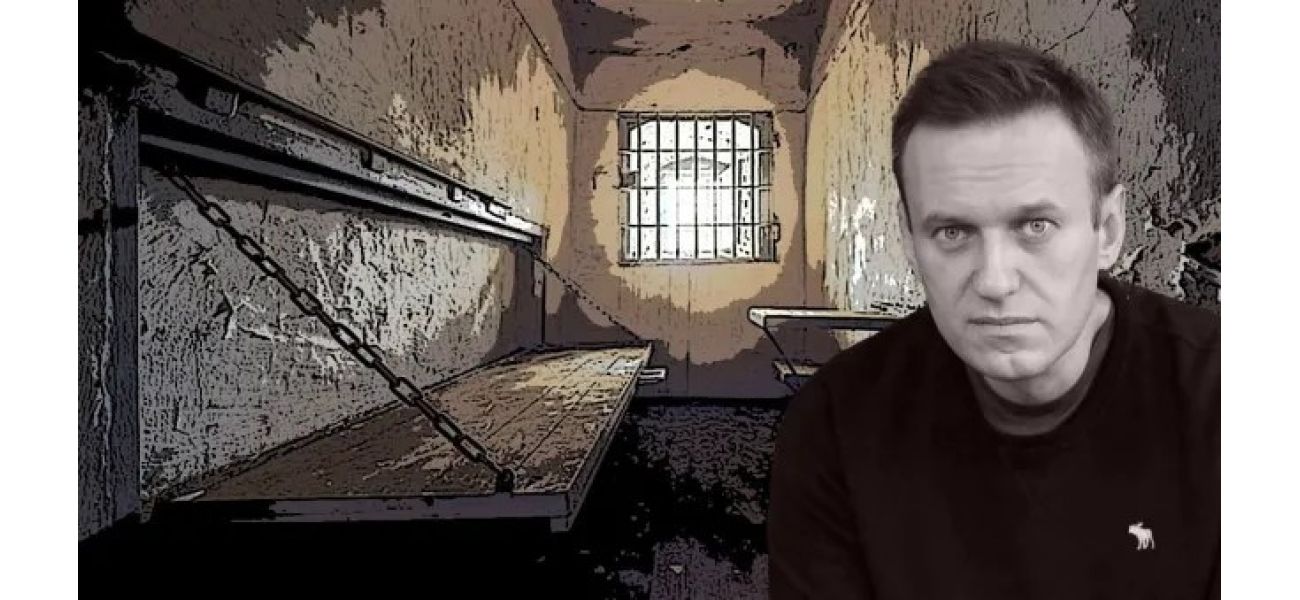Recent evidence shows that Alexei Navalny, a critic of Putin, was poisoned prior to his death.
Navalny's prediction about Putin's downfall could still become a reality.
February 16th 2025.

During his three years in a remote penal colony, Alexei Navalny was repeatedly subjected to the harsh conditions of a tiny punishment cell. The opposition leader's time in prison was widely believed to be politically motivated, and his supporters were deeply concerned for his well-being. Sadly, their fears were confirmed when a leaked report into Navalny's death revealed that he had been poisoned.
According to John Sweeney, author of the best-selling book about Navalny, the report provides "compelling evidence" of foul play. The Russian detective who filed the report had documented how Navalny had vomited and suffered convulsions shortly before his death, a year ago today. This report was filed while Navalny was being held in a brutal prison in the Arctic Circle, known for its inhumane treatment of inmates.
Navalny's supporters strongly believe that he was murdered, and that the Kremlin played a role in covering up the crime. Sweeney explained, "There's no question that Alexei Navalny was poisoned. The detective who logged his possessions after his death, Alexander Varapaev, found swabs and specs of vomit among his belongings. However, these references were mysteriously removed from the official list of his possessions, almost as if someone high up in the Kremlin didn't want people to know that [Putin] had had Navalny poisoned."
The journalist revealed that the evidence of poisoning was further supported by Varapaev's report, which detailed Navalny's severe symptoms and loss of consciousness. Sweeney's book, titled "Murder in the Gulag," delves into the life and death of Navalny and exposes the attempts to cover up the truth behind his tragic end.
The report was unearthed by Russian investigative journalist Roman Dobrokhotov and has been described by Sweeney as one of the "Cluedo cards" laid out for all to see. The death of the activist, who was serving a 19-year sentence, was just one in a series of suspicious deaths that have been linked to Putin's regime. These include the poisoning of former spy Alexander Litvinenko in London and the nerve agent attack on Russian dissident Sergei Skripal in Salisbury, which resulted in the death of Dawn Sturgess.
Sweeney explained that the UK authorities were able to identify Russian hitmen as being responsible for these attacks, but it is difficult to prove the use of Novichok in Navalny's case. He stated, "We can't prove Novichok was used because the deal for Navalny's funeral was that the family would only be allowed the body if no medical tests were carried out. It's not right, but that's the horrible deal his mother ended up accepting."
The journalist firmly believes that the only person with the power to poison the leader of the opposition in one of the most secure prisons in the country is the ruler himself, Vladimir Putin. In August 2020, Navalny narrowly survived being poisoned with Novichok, which led to him falling into a coma. He was imprisoned the following year and subjected to brutal treatment before his death in a prison known as the "Polar Wolf."
According to the Anti-Corruption Foundation founded by Navalny, he spent a total of 283 days in a punishment cell on false charges. However, his voice and message have not been silenced. At his funeral, the melody from his favorite film, Terminator 2, was played as his coffin was lowered into the ground. Sweeney believes that this was a final message to Putin's "neurosis," with Navalny's last words being "I'll be back."
While there may not be an immediate challenge to Putin's rule, Sweeney draws parallels to the ending of Terminator 2, where the machine chooses to be destroyed to prevent the system from wiping out humanity. He elaborated, "The film sends a message that if you can create a machine with empathy, it is not our enemy. Navalny was not a saint, but he believed in holding Putin accountable through democratic means. He stood for a country that respects the rule of law, common decency, and democracy."
Sweeney also encourages skeptics to watch the Oscar-winning documentary about Navalny's life, which showcases his resilience and humor in the face of the Russian police state. He concludes, "Like Claus Von Stauffenberg, the German army officer who attempted to kill Hitler, Navalny provides a symbol of resistance and reminds people that there is an alternative to a country ruled by tyranny."
During his three-year stay in a remote penal colony, Alexei Navalny faced numerous instances of being thrown into a small punishment cell. These harsh conditions were a result of what many believed to be politically-motivated charges against the opposition leader. However, Navalny's time in the penal colony came to a tragic end when he passed away a year ago today.
A recent leaked report into Navalny's death has shed light on the circumstances surrounding his passing. According to John Sweeney, the author of a best-selling book about Navalny, the report provides "compelling evidence" that he was poisoned. Sweeney reveals that a Russian detective had recorded Navalny's symptoms, including vomiting and convulsions, before his death. These details were later removed from the official report, leading many to believe that there was an effort to cover up the truth about Navalny's death.
The report was filed by a detective who was logging Navalny's possessions at the harsh penal colony in the Arctic Circle where he was being held. Among Navalny's belongings were a copy of Tolstoy's War and Peace, asthma medication, and a breathing mask. However, the detective also noted swabs and vomit, which were not included in the official list of possessions. Sweeney believes that this is strong evidence of poisoning.
The journalist also reveals that the report was uncovered by Russian investigative journalist Roman Dobrokhotov. He describes it as one of the many "cluedo cards" laid out for all to see, hinting at the involvement of higher-ups in the Kremlin. This report adds to the string of murders and assassination attempts against those who have spoken out against Putin's regime.
Sweeney highlights the cases of Alexander Litvinenko and Sergei Skripal as examples of previous attacks on Putin's critics. In both instances, Russian hitmen were identified as the culprits, causing international outrage. Despite these incidents, Russia has denied any involvement in these murders. However, Sweeney argues that the evidence found in Navalny's case is too strong to ignore. He points out that the only person with the power to poison Navalny in one of the most secure prisons in the country is none other than Putin himself.
Navalny's death was not the first time he had been targeted. In August 2020, he narrowly survived being poisoned with the nerve agent Novichok. This led to him falling into a coma and later being imprisoned. During his time in the Russian penal system, Navalny was subjected to brutal and inhumane treatment, with his last stop being the "Polar Wolf" prison in Kharp. According to the Anti-Corruption Foundation that Navalny founded, he spent a total of 283 days in a punishment cell for what they claim were "trumped-up pretexts."
The Russian prison service released a statement claiming that Navalny had fallen ill after a walk and subsequently lost consciousness. However, Russian spy chief Sergei Naryshkin later stated that Navalny had died of natural causes, without providing any further details. The Anti-Corruption Foundation has described Navalny's death as murder and accused Moscow of trying to cover up the crime. Despite his passing, Navalny's voice continues to speak out against Putin's regime.
At Navalny's funeral, the iconic Terminator 2 melody was played, a nod to his favorite film. The rebel's last joke of "I'll be back" was seen as a message directed at Putin's "neurosis." Sweeney believes that this was a sign of Navalny's resilience and determination, even in the face of adversity. While it may seem bleak at the moment, Sweeney draws parallels to the end of Terminator 2, where the machine chooses to destroy itself to prevent the system from wiping out humanity. He believes that if there is empathy, even in machines, they are not our enemies.
Sweeney also addresses some criticism of Navalny, noting that he had a brush with the far right in the past. However, he argues that in his later years, Navalny had changed and was not the same person. He points to a documentary about Navalny's life that won an Oscar, showing how he recovered from the assassination attempt and used his wit and intelligence to challenge the Russian police state.
In the end, Navalny stood for something much greater than himself. He was a symbol of resistance against tyranny and a reminder that there is always an alternative in a country run by oppression. He did not seek to destroy Putin, but rather hold him accountable and fight for a place that respects the rule of law, decency, and democracy.
According to John Sweeney, author of the best-selling book about Navalny, the report provides "compelling evidence" of foul play. The Russian detective who filed the report had documented how Navalny had vomited and suffered convulsions shortly before his death, a year ago today. This report was filed while Navalny was being held in a brutal prison in the Arctic Circle, known for its inhumane treatment of inmates.
Navalny's supporters strongly believe that he was murdered, and that the Kremlin played a role in covering up the crime. Sweeney explained, "There's no question that Alexei Navalny was poisoned. The detective who logged his possessions after his death, Alexander Varapaev, found swabs and specs of vomit among his belongings. However, these references were mysteriously removed from the official list of his possessions, almost as if someone high up in the Kremlin didn't want people to know that [Putin] had had Navalny poisoned."
The journalist revealed that the evidence of poisoning was further supported by Varapaev's report, which detailed Navalny's severe symptoms and loss of consciousness. Sweeney's book, titled "Murder in the Gulag," delves into the life and death of Navalny and exposes the attempts to cover up the truth behind his tragic end.
The report was unearthed by Russian investigative journalist Roman Dobrokhotov and has been described by Sweeney as one of the "Cluedo cards" laid out for all to see. The death of the activist, who was serving a 19-year sentence, was just one in a series of suspicious deaths that have been linked to Putin's regime. These include the poisoning of former spy Alexander Litvinenko in London and the nerve agent attack on Russian dissident Sergei Skripal in Salisbury, which resulted in the death of Dawn Sturgess.
Sweeney explained that the UK authorities were able to identify Russian hitmen as being responsible for these attacks, but it is difficult to prove the use of Novichok in Navalny's case. He stated, "We can't prove Novichok was used because the deal for Navalny's funeral was that the family would only be allowed the body if no medical tests were carried out. It's not right, but that's the horrible deal his mother ended up accepting."
The journalist firmly believes that the only person with the power to poison the leader of the opposition in one of the most secure prisons in the country is the ruler himself, Vladimir Putin. In August 2020, Navalny narrowly survived being poisoned with Novichok, which led to him falling into a coma. He was imprisoned the following year and subjected to brutal treatment before his death in a prison known as the "Polar Wolf."
According to the Anti-Corruption Foundation founded by Navalny, he spent a total of 283 days in a punishment cell on false charges. However, his voice and message have not been silenced. At his funeral, the melody from his favorite film, Terminator 2, was played as his coffin was lowered into the ground. Sweeney believes that this was a final message to Putin's "neurosis," with Navalny's last words being "I'll be back."
While there may not be an immediate challenge to Putin's rule, Sweeney draws parallels to the ending of Terminator 2, where the machine chooses to be destroyed to prevent the system from wiping out humanity. He elaborated, "The film sends a message that if you can create a machine with empathy, it is not our enemy. Navalny was not a saint, but he believed in holding Putin accountable through democratic means. He stood for a country that respects the rule of law, common decency, and democracy."
Sweeney also encourages skeptics to watch the Oscar-winning documentary about Navalny's life, which showcases his resilience and humor in the face of the Russian police state. He concludes, "Like Claus Von Stauffenberg, the German army officer who attempted to kill Hitler, Navalny provides a symbol of resistance and reminds people that there is an alternative to a country ruled by tyranny."
During his three-year stay in a remote penal colony, Alexei Navalny faced numerous instances of being thrown into a small punishment cell. These harsh conditions were a result of what many believed to be politically-motivated charges against the opposition leader. However, Navalny's time in the penal colony came to a tragic end when he passed away a year ago today.
A recent leaked report into Navalny's death has shed light on the circumstances surrounding his passing. According to John Sweeney, the author of a best-selling book about Navalny, the report provides "compelling evidence" that he was poisoned. Sweeney reveals that a Russian detective had recorded Navalny's symptoms, including vomiting and convulsions, before his death. These details were later removed from the official report, leading many to believe that there was an effort to cover up the truth about Navalny's death.
The report was filed by a detective who was logging Navalny's possessions at the harsh penal colony in the Arctic Circle where he was being held. Among Navalny's belongings were a copy of Tolstoy's War and Peace, asthma medication, and a breathing mask. However, the detective also noted swabs and vomit, which were not included in the official list of possessions. Sweeney believes that this is strong evidence of poisoning.
The journalist also reveals that the report was uncovered by Russian investigative journalist Roman Dobrokhotov. He describes it as one of the many "cluedo cards" laid out for all to see, hinting at the involvement of higher-ups in the Kremlin. This report adds to the string of murders and assassination attempts against those who have spoken out against Putin's regime.
Sweeney highlights the cases of Alexander Litvinenko and Sergei Skripal as examples of previous attacks on Putin's critics. In both instances, Russian hitmen were identified as the culprits, causing international outrage. Despite these incidents, Russia has denied any involvement in these murders. However, Sweeney argues that the evidence found in Navalny's case is too strong to ignore. He points out that the only person with the power to poison Navalny in one of the most secure prisons in the country is none other than Putin himself.
Navalny's death was not the first time he had been targeted. In August 2020, he narrowly survived being poisoned with the nerve agent Novichok. This led to him falling into a coma and later being imprisoned. During his time in the Russian penal system, Navalny was subjected to brutal and inhumane treatment, with his last stop being the "Polar Wolf" prison in Kharp. According to the Anti-Corruption Foundation that Navalny founded, he spent a total of 283 days in a punishment cell for what they claim were "trumped-up pretexts."
The Russian prison service released a statement claiming that Navalny had fallen ill after a walk and subsequently lost consciousness. However, Russian spy chief Sergei Naryshkin later stated that Navalny had died of natural causes, without providing any further details. The Anti-Corruption Foundation has described Navalny's death as murder and accused Moscow of trying to cover up the crime. Despite his passing, Navalny's voice continues to speak out against Putin's regime.
At Navalny's funeral, the iconic Terminator 2 melody was played, a nod to his favorite film. The rebel's last joke of "I'll be back" was seen as a message directed at Putin's "neurosis." Sweeney believes that this was a sign of Navalny's resilience and determination, even in the face of adversity. While it may seem bleak at the moment, Sweeney draws parallels to the end of Terminator 2, where the machine chooses to destroy itself to prevent the system from wiping out humanity. He believes that if there is empathy, even in machines, they are not our enemies.
Sweeney also addresses some criticism of Navalny, noting that he had a brush with the far right in the past. However, he argues that in his later years, Navalny had changed and was not the same person. He points to a documentary about Navalny's life that won an Oscar, showing how he recovered from the assassination attempt and used his wit and intelligence to challenge the Russian police state.
In the end, Navalny stood for something much greater than himself. He was a symbol of resistance against tyranny and a reminder that there is always an alternative in a country run by oppression. He did not seek to destroy Putin, but rather hold him accountable and fight for a place that respects the rule of law, decency, and democracy.
[This article has been trending online recently and has been generated with AI. Your feed is customized.]
[Generative AI is experimental.]
0
0
Submit Comment





